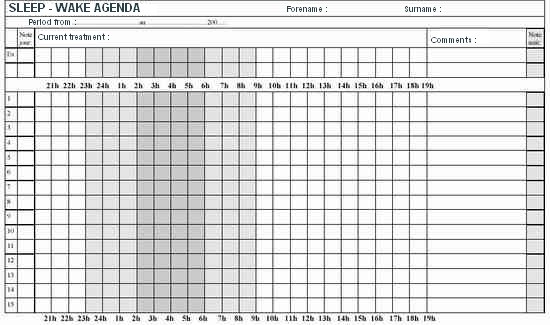Home > Welcome > Sleep-wake pathologies > Insomnia - wanting to sleep > Personal management of insomnia
Personal management of insomnia
Saturday 28 July 2007
All the versions of this article: [English] [français]

- Cognitive and pharmaceutical trap
How to manage the problems of insomnia ?
When can the treatments be used .
The personal management;
The vicious circle of the sleeping pills:
Basic principles of self-management;
Efficiency of the program.
How to manage the problem ?
By taking a treatment ?
First reflex, but not the best thing to do...
In fact, the sleeping pills only act on the awareness of the events :
- Their amnesic effect is only exerted on the memory and the perception of the nocturnal episodes wakefulness;
- The anxiolytic effect of these products minimizes the arousing feelings that contribute to prolonge the duration of the arousals (motivation, anger and fear, see below).
That phenomenon explains why some people keep on using the same medications during years although all the studies confirm the exhastion of their effect.
Most of the medications used to sleep present, though, several disadvantages :
- The bad sleeper convinces him/herself gradually that he/she is unable to sleep without the help of a drug, even "light" (whereas the good sleeper goes to sleep trustfully).
That feeling of helplessness and distrust (which can be acquired from the childhood on) is in the heart of the mechanisms of insomnia. - They conceal the natural signals of sleep and, thereby, aggravate the handicap of someone who "no longer knows what it is to feel sleepy in the evening";
- The increase of the sleep duration is carried out at the expense of its quality (with the disappearance of slow wave sleep);
- The sleeping pills loose their efficiency very quickly even if they are not used every night;
- They cause side effects during the night (sleepwalking, confusion ...) and during the day (sleepiness, tiredness, dry mouth, dizzy spells ...);
- They are responsible for memory and attention disorders;
- In old people, they favor balance disorders and falls;
- They are contraindicated in the case of suspicion of sleep apnea.

- Their implication in work and traffic accidents is certain.
Abusive advertisement...
The advertisements from the sleeping pill pharmaceutical companies (designed for the prescribers) often claim "good results" and a high satisfaction index issued from partly truncated studies.
In fact, in tested volunteers (sometimes recruted in a population of chronic insomniacs), the shortening of sleep onset latencies or of the duration of the arousals recorded in the start of the treatment never persists longer that a few weeks intake.
These results may not be published in France because the maximum authorized prescription time is limited to four weeks.
But the sales curves show that the prescription of these products is often renewed over years.
The attempts of withdrawal face the problem of the physical and psychological addiction.
It is the rebound insomnia which consists in a temporary worsening of the sleep difficulties some time after the cessation of the sleeping pill (sometimes up to one or two months later).
The pharmacological dependence is very strong. Withdrawal symptoms have been described several months after full stop. It is caused by the mechanism of action and by the high concentration of "psycho-actives" in the brain. (Refer to the site about the withdrawal of BZ, on the page with the external links (English website)).
As for any toxicomania, the phenomenons of tolerance, getting accustomed, addiction, have a very harmful effect on the individual, and that, precisely at the moment when he becomes aware of his problem.
That insomnia of rebound incites the insomniac to return to his/her medications and that personal failure reinforces his/her feeling of helplessness. That is the psychological dependence.
![]()
The vicious circle of the sleeping pills :

- Wanting to sleep -> satisfaction with the efficiency of the sleeping pill ->
- Tolerance -> increase of the doses
- Accustomance-> failure
- Withdrawal attempt -> rebound insomnia
- Return to a "stronger" sleeping pill"-> physical and psychological dependence.
Some associations of sick persons turn against the initial prescriber. (See the above mentioned link)
When can these medications be used ?

- Not sleepy
- On the short term for a recent insomnia ? In order to avoid to go over to chronicity ?
MAYBE... BUT... very controversial - In front of an accute insomnia resulting from severe stress (death of a relative, surgical operation...) ?
MAYBE ... BUT... each case is particular... (here they anesthesize the pain, but it sometimes delays the mourning process) - In the case of jetlag ?
WHY NOT, in order to reinforce the efficiency of the new «time givers» (Zeitgeber) : the light, the meals... but one must be careful not to neglect the inertia of the system which will take several weeks to match with the new "time givers"(cf.). - In the case of chronic difficulties with sleep ?
YES, but in a dynamic of withdrawal. To help breaking to vicious circle of insomnia and anxiety, with, as a support, a treatment that mainly aims to change the beliefs and behaviors and which insist on the personal management of the problem. - YES, when the dependance is already probable !
Tranquillizers and sleeping pills must never be stopped suddenly.
Two conditions determine the probabilities of success of a withdrawal :
- the sick person must have brought some of his attributions about sleep to evolve, he/she must learn to "think differently" in order to understand his/her sleep and in his/her abilities to take control over it.
- the withdrawal program must be extremely progressive because of the pharmaceutical addiction phenomenons, which can last very long.
The personal management : take control of one’s own destiny.
- The approach is guided in order to help the subject to take control again over his/her nights through personal management. The sick person is no longer a victim who feeds useless regrets, but a manager of his/her sleep who learns to feel responsible for and in charge of his/her own destiny.
- The aim is not be to heal every insomnia, because one bad night of sleep from time to time is normal (or even beneficial) from time to time.
- The program must help to diminish the consequences of difficulties of which a part will probably remain. «A healed insomniac is a bad sleeper who has learned to no longer make a problem of it».
The insomniac has learned to use resources that a good sleeper doesn’t even imagine (that can be compared to, for example, ride a bike with one wheel). The organism can remember it at any time and use these new skills.

Basic principles of sleep self-management.
- The commitment and the effort
That program requires a couple of efforts and a bit of discipline.
The procedures and the instructions must remain very simple and direct but the application of the whole program is the key to success.Commitment over time : it all depends of the duration and the severity of the sleep problem, of the presence of physical and psychological problems and above all of your own motivation.
Insomnia is the result of a long process that takes root long before the first "sleepless nights".
The duration of the program depends of the way that will have to be made to review certain very old thought patterns.One must not expect a quick enhancement or results in one week or two. The problem with sleep is probably already very old (and probably even more than a sick person believes it is). A commitment of several weeks or months is very little compared to what he/she has already been through.
- Support
That program of treatment might require to change a couple of sleep habits or way of living.
This also sometimes concerns the partner or other members of the family. Their support can provide a precious help. It is important to obtain their participation and support. - Establish realistic targets :
Define what changes are wanted : the stress is not put on the extension of the sleep duration but rather on enhancing its quality.
- do you want to fall asleep faster ?
- wake up less often ?
- function better during the day ?
- take no more medications ?
- Do you want to be in a good shape ? - Use a Sleep/Wake diary.
It is sometimes useful to fill out a sleep/wake diary during one or two weeks before the start of the treatment. A "inventory of fixtures" is obtained to start with (it will be useful to make comparisons as the patient goes along), and the behavioral habits that are harmful for the quality of sleep are identified.
Clic on the link to download a sleep diary and the user’s manual in a Pdf format.In a second tense, the patient decides to proceed to experiments on his/her sleep. The sleep/wake diary allows to observe their result in a scientific manner.
From a very subjective perception of sleep, the sick person goes over to a more correct objective observation.
NB : a typical characteristic of insomnia is the feeling that sleep is out of control.
To fill out the Sleep/Wake diary mobilizes the patient in a positive way. It allows him/her to understand that he/she can become again the master of his sleep. - Develop a more scientific attitude.
Try to understand what factors interfere with sleep.
One must be curious and precise like a scientist can be.
The basis of scientific thinking relies ont the best way to make the part of things between appearence and reality. It is the way to eliminate the bias that often lead to big errors of interpretation.
Sleep is of better quality when it occurs in harmony with the biological rythms. The analysis of the answers to the questionnaires of sleep typology can help to establish the somnological profile of the subject.
Efficiency of the program.
The components of this treatment have been the subject of a lot of research : the treated people have enhanced their sleep both in quality and efficiency.
Sometimes, several months of efforts have been necessary to obtain that enhancement.
En pratique:- one third of the patients quit the program on the way...
- one third of the patients is satisfied. These subjects say that they have got a more positive look on their sleep (in our experience, that slightly fatalist attitude presents a risk of relapse).
- one third of the patients claim they are healed. They find no more interest in taking a sleeping pill.
The success of the program depends a lot of the seriousness and the discipline of the subject. It is a demanding therapeutic method that can’t be bought in a pharmacy ...
The important thing is to manage to gradually retrieve a feeling of trust in one’s sleep by getting rid of all the awakening thoughts and behaviors which contribute to ensure the continued existence of the vicious circle of insomnia.
In these conditions, recovery can be complete and definitive.It is Oscar Wilde who is supposed to have said to prefer to live with remorse than with regrets...
One feels regret for something he/she does not control.
The insomniac is somewhat like a victim of the weather in his nights.
He/she doesn’t control the climate. He/she is happy when the weather is nice (and when, for once, he/she had a good night’s sleep) and suffers when it rains (and he/she has to get up after a night of torture).
He/she feels more and more helpless and dreads his/her nights of insomnia more and more and more.
One can regret that the rain falls on a wedding day, for example, but no remorse is felt against a thunderstorm.One feels remorse against something one is responsible for.
A good sleeper feels fully responsible of his/her sleep. In case of a bad night, he knows the causes and consequences of what happens to him/her and is totally able to take the rectificative actions when it occurs.
Someone who has never had problems with sleep often reacts the good way, without knowing it, with "common sense". (He/she is concerned with none of the items of the sleep disorders screening questionnaire
The former bad sleeper had to learn to do so.The healing of insomnia sometimes requires that transition from regret to remorse.
NB: "Autonomy" : the use of its own laws; from the greek autos : "oneself, itself" and nomos : "the law". Autonomy is the ability to fix one’s rules of living. The treatment of insomnia is the return of the autonomy regarding sleep.See the other articles about insomnia on the website :


- More information...
- A very eloquent "eBook" by Dr Daniel F. Kripke about the "Dark side of the sleeping pills"..(In English)
- An internal link to a new article (March 2007) about the confusional risks linked to the new sleeping pills.
